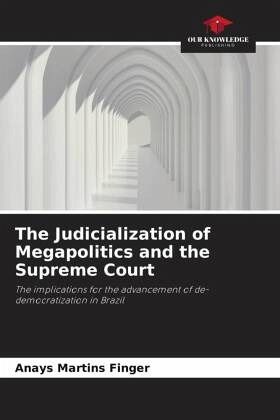
The Judicialization of Megapolitics and the Supreme Court
The implications for the advancement of de-democratization in Brazil
Versandkostenfrei!
Versandfertig in 6-10 Tagen
40,99 €
inkl. MwSt.

PAYBACK Punkte
20 °P sammeln!
Representative government has faced several impasses in the contemporary world. Brazil is no different. There are several actors and factors that have contributed to the political crisis installed in the country. Thus, this work aims to demonstrate how the judicialization of Megapolitics, from the jurisdictional action of the Supreme Court in the trial of ADPF 378, during the impeachment of Dilma Rousseff, contributed to the advancement of de-democratization in Brazil. The investigation of this theme was driven by the protagonism that the Court assumed before the political arena, a fact that w...
Representative government has faced several impasses in the contemporary world. Brazil is no different. There are several actors and factors that have contributed to the political crisis installed in the country. Thus, this work aims to demonstrate how the judicialization of Megapolitics, from the jurisdictional action of the Supreme Court in the trial of ADPF 378, during the impeachment of Dilma Rousseff, contributed to the advancement of de-democratization in Brazil. The investigation of this theme was driven by the protagonism that the Court assumed before the political arena, a fact that was consolidated with the unfolding of the work of the so-called Operation Lava-Jato. Based on this, the following question was elaborated, which will guide this work: in what way the Supreme Court, from the decision rendered in the trial of ADPF 378, in the context of the impeachment of Dilma Rousseff, contributed to the process of democratization underway in the country?












